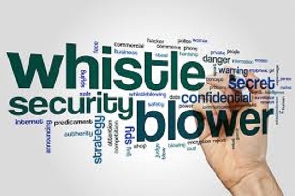Opinions of Sunday, 5 March 2023
Columnist: Percy Boye
The role of whistleblowers in exposing money laundering
This article examines the crucial role that whistleblowers play in exposing money laundering, and the challenges they face when coming forward with information. It also explores what protections are in place to support whistleblowers and whether more needs to be done to encourage and incentivize them to speak out.
Money laundering is a complex issue that involves many different players, from financial institutions to criminal organizations. One key player in the fight against money laundering is the whistleblower.
Whistleblowers are individuals who come forward with information about illegal activities, such as money laundering, that they have witnessed or been a part of.
The role of whistleblowers in exposing money laundering cannot be overstated. They are often the first line of defense against financial crimes, and their information can be instrumental in investigations and prosecutions.
However, coming forward as a whistleblower is not an easy decision to make, and there are significant challenges and risks involved.
One of the biggest challenges that whistleblowers face is the fear of retaliation. Whistleblowers may be subjected to harassment, intimidation, or even physical harm by those who are involved in the illegal activity they are exposing. Additionally, whistleblowers may face professional repercussions, such as losing their job or damaging their reputation.
To address these challenges and encourage more whistleblowers to come forward, there are several steps that can be taken. One important step is to strengthen legal protections for whistleblowers.
Whistleblower protection laws should be updated and strengthened to provide better safeguards for those who come forward with information.
Another step that can be taken is to provide financial incentives for whistleblowers. This could include offering a monetary reward for information that leads to successful prosecutions or convictions. This would not only encourage more whistleblowers to come forward but would also serve as a deterrent to potential money launderers.
Education and awareness campaigns can also be effective in encouraging whistleblowers to come forward. By educating the public about the importance of reporting financial crimes, and the protections that are available for whistleblowers, more people may be motivated to come forward with information.
Finally, it is important to create a culture of accountability and transparency within the financial industry. Financial institutions should be held accountable for their role in money laundering, and individuals who engage in illegal activity should be prosecuted to the fullest extent of the law.
By creating a strong deterrent against money laundering, and promoting transparency and accountability, we can work towards a future where financial crimes are less prevalent, and whistleblowers are empowered to come forward with information.













